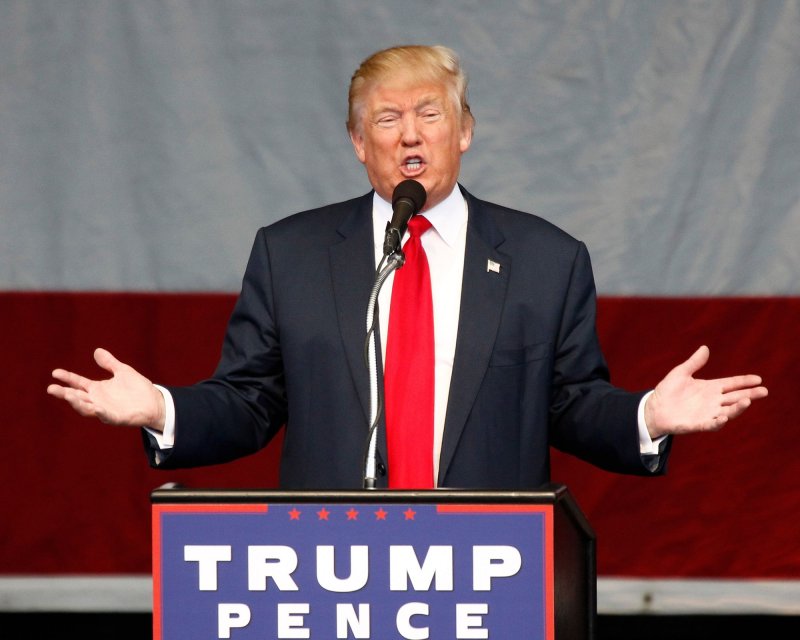Republican presidential candidate Donald Trump addresses supporters during a rally at the Henderson Pavilion in Henderson, Nev., on Wednesday. Photo by James Atoa/UPI |
License Photo
If Donald Trump wants to bounce back from his poor showing in the first presidential debate, it won't be easy. It's hard to imagine Trump doing what he needs to do, especially in the town hall-style debate. And no, just avoiding gaffes (like George H.W. Bush's ill-advised checking of his watch during a 1992 town hall debate) won't be enough.
Honestly, it's hard to see why Team Trump consented to this format in the first place. Trump's image as an alpha male who doesn't emote might play well in a boardroom, but it's exactly the wrong recipe for success here.
In the lead-up to the first-ever town hall debate in 1992, NBC News's Tom Brokaw described it as "part debate, part game show, part talk show and all-important." You might then assume that Trump, a reality star, would excel in this format.
The problem is that Trump isn't your average reality star. On The Apprentice, he has almost always maintained control. And his style of campaigning, which involves holding court from on high at rallies (not taking questions from voters at New Hampshire diners or at Pizza Ranches or state fairs in Iowa), has done little to prepare him for talking to regular people, much less tolerating their whiny questions.
Now, in fairness to Trump, he projects a sort of "everyman" persona that carried him through the primaries — a sort of "blue-collar billionaire" image. Part of this involves Trump being positioned as our surrogate. He fights media elitists and corrupt politicians for us — the way only a rich guy who doesn't care what anybody thinks can. The problem is that in a town hall debate, the tough questions are more likely to be asked by average people than by a mainstream media elite. And how do you demonize average Americans?
Come to think of it, Trump has already done that once, and it didn't work out well for him. Remember the Gold Star family that Trump declared jihad on a few months back? What are the odds that some civilian emerges from this town hall as a Khizr Kahn or Joe the Plumber-esque celebrity that Trump spends a week unwisely attacking? For betting folks, I'll give it at least 50-50 odds.
In a normal debate, Trump might serve as a proxy for Joe Six-Pack, but in a town hall debate, real Joe Six-Packs will be asking him questions. Which brings us to the next problem: In politics, it is axiomatic that the question asked is more important than the answer given. Trump's success hinges on being asked certain questions (and not asked others).
It's easy to conceive a question that would help Trump win. It goes like this: "Mr. Trump, my name is Bob. I'm a coal miner from West Virginia and a lifelong Democrat. Why shouldn't I support Hillary Clinton this time?" Trump would hit that out of the park. But do you think "Bob" will have a chance in hell of being at this debate?
Here's a more likely question: "Mr. Trump, my name is Suzy Martinez. Our son is physically disabled, and we love him and he loves us. And when I saw you mocking a reporter with a disability, he cried. Why should we vote for someone who makes fun of people like my son?"
Or how about this: "Mr. Trump, I work two jobs just to make ends meet. Last year, I paid thousands of dollars in taxes. But I just found out that you haven't paid any for decades. Why should I vote for someone who isn't paying his fair share, and why won't you release your tax records?"
These questions, if asked by a member of the media serving as moderator, could be parried, mocked, or dismissed by Trump. But what happens when those same questions come from regular Americans?
Empathy is the most important quality a candidate must demonstrate in this debate format. And, for all his strengths (and he is a talented guy), Trump has never demonstrated to us the ability to emote.
That's not to say that Hillary Clinton is all that great at connecting with average Americans. When it comes to demonstrating empathy, she will never come close to her husband, Bill Clinton. But she's at least willing to fake it. Trump, if I'm right, won't even try. And the likely message will be this: Trump doesn't feel your pain.
Roll Call columnist Matt K. Lewis is a senior contributor to the Daily Caller and author of the book "Too Dumb to Fail." Follow him on Twitter @MattKLewis.
Get breaking news alerts and more from Roll Call on your iPhone or your Android.















